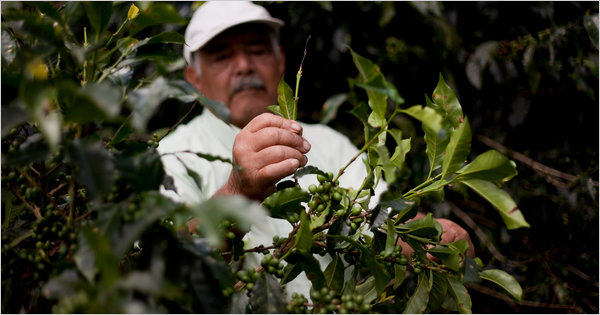Warming climate damages Colombia coffee crop, raising prices
By ELISABETH ROSENTHAL
March 9, 2011 TIMBÍO, Colombia — Like most of the small landowners in Colombia’s lush mountainous Cauca region, Luis Garzón, 80, and his family have thrived for decades by supplying shade-grown, rainforest-friendly Arabica coffee for top foreign brands like Nespresso and Green Mountain. A sign in the center of a nearby town proclaims, “The coffee of Cauca is No. 1!” But in the last few years, coffee yields have plummeted here and in many of Latin America’s other premier coffee regions as a result of rising temperatures and more intense and unpredictable rains, phenomena that many scientists link partly to global warming. Coffee plants require the right mix of temperature, rainfall and spells of dryness for beans to ripen properly and maintain their taste. Coffee pests thrive in the warmer, wetter weather. Bean production at the Garzóns’ farm is therefore down 70 percent from five years ago, leaving the family little money for clothing for toddlers and “thinking twice” about sending older children to college, said Mr. Garzon’s 44-year-old son, Albeiro, interviewed in a yellow stucco house decorated with coffee posters and madonnas. The shortage of high-end Arabica coffee beans is also being felt in New York supermarkets and Paris cafes, as customers blink at escalating prices. Purveyors fear that the Arabica coffee supply from Colombia may never rebound — that the world might, in effect, hit “peak coffee.” In 2006, Colombia produced more than 12 million 132-pound bags of coffee, and set a goal of 17 million for 2014. Last year the yield was nine million bags. …
“Coffee production is under threat from global warming, and the outlook for Arabica in particular is not good,” said Peter Baker, a coffee specialist with CABI, a research group in Britain that focuses on agriculture and the environment, noting that climate changes, including heavy rains and droughts, have harmed crops across many parts of Central and South America. A top coffee scientist, he has rattled trade forums by warning, Cassandra-like, of the possibility of “peak coffee,” meaning that, like oil supplies, coffee supplies might be headed for an inexorable decline unless growers make more concerted efforts to expand production globally. The Specialty Coffee Association of America warned this year, “It is not too far-fetched to begin questioning the very existence of specialty coffee.” … Average temperatures in Colombia’s coffee regions have risen nearly one degree in 30 years, and in some mountain areas the increase has been double that, says Cenicafé, the national coffee research center. Rain in this area was more than 25 percent above average in the last few years. At the new, higher temperatures, the plants’ buds abort or their fruit ripens too quickly for optimum quality. Heat also brings pests like coffee rust, a devastating fungus that could not survive the previously cool mountain weather. …
Heat Damages Colombia Coffee, Raising Prices via Richard Pauly

